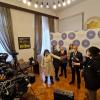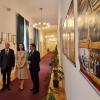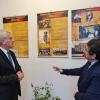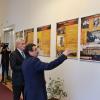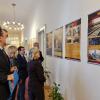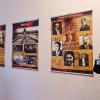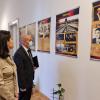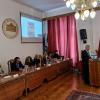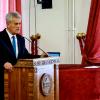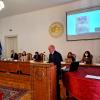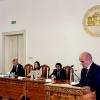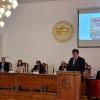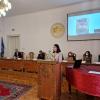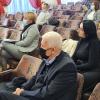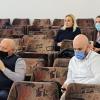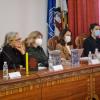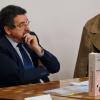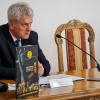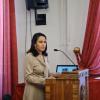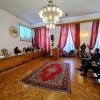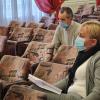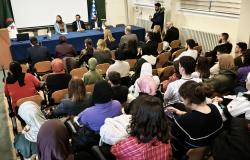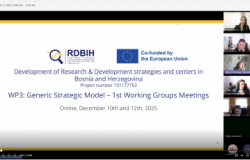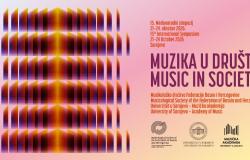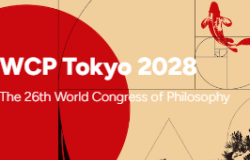The University of Sarajevo commemorated the Holocaust Remembrance Day
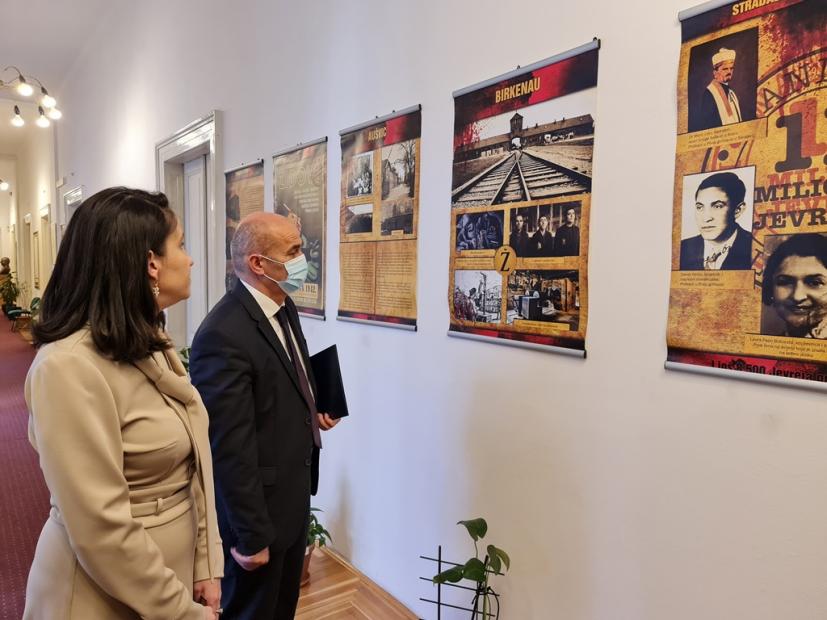
On the occasion of commemorating 27 January - Holocaust Remembrance Day, the Institute for Research of Crimes against Humanity and International Law of the University of Sarajevo annually organizes and participates in a series of activities to honor Holocaust victims and further study crimes committed in Bosnia and Herzegovina. during the Holocaust. This year, the Institute for Research of Crimes against Humanity and International Law of the University of Sarajevo, in cooperation with the Jewish Community in Bosnia and Herzegovina and the UNESCO Office in Bosnia and Herzegovina, and the Association "Haggadah" Sarajevo, organized the commemoration of 27 January – Holocaust Memorial Day.
According to the event program of 20 January 2022 at the University of Sarajevo Rectorate, the Eli Tauber opened the exhibition “The Final Solution to the Jewish Question” and the round table Wannsee Conference in Berlin (20 January 20, 1942) – ‘Final Solution" the Jewish question.’
In this way, the University of Sarajevo has joined universities around the world that commemorate Holocaust Remembrance Day.
Prof. Dr. Rasim Muratović, director of the Institute for Research on Crimes against Humanity and International Law at the University of Sarajevo, said the final Jewish question was the end of hope for all European Jews, where the first plan was to move to Madagascar and continue living there peacefully. there was nothing of that. The second plan, recalls Professor Muratović, was for European Jews to move to Eastern Europe and do what they know in labor camps there. “These labor camps have been turned into concentration camps in which about six million Jews have been killed. This ended their lives, they burned in the flames of Nazism, and over three million Jews do not have their graves, they ended up in the dust and ashes of concentration camps and gas chambers.”
Mr. Siniša Šešum, Head of the UNESCO Office in BiH, pointed out that Holocaust education is extremely important for UNESCO.
Rector of the University of Sarajevo Prof. Dr. Rifat Škrijelj said that today's event at the University of Sarajevo was an academic contribution to reminding humanity of the reminders of those dark times.
“The moment we live in shows that the Holocaust and genocide and all such forms of evil that were present on planet Earth can be repeated, but I hope they will not. And I would be more sure that it would not happen if all those who committed them were brought to justice and those who deny them were also sanctioned in a serious way” said Rector Škrijelj.
Sarajevo Mayor Doz. Dr. Benjamina Londrc-Karić stated that the story of the Jews in BiH and the story of the Jews in Sarajevo is a story about the history of this country and the capital.
“We went through beautiful and less beautiful moments together, and it is our obligation to remember all of Sarajevo and Bosnia and Herzegovina. We are protecting the Jews who died during the Holocaust, but not only as a memory, but also as an important reminder that the evil of fascism must never be repeated” said Mayor Londrc-Karić. He believes that the city of Sarajevo is a multicultural city that nurtures all the values of diversity and that all the peoples who live here are friends and neighbors. “I believe that the city of Sarajevo and BiH always give hope and all the citizens of Sarajevo give hope that we go to a better future and a better tomorrow. We take care of our history, we remember and pay tribute to all the victims who died in the Second World War and during the aggression on BiH, and all for the sake of a common message, for the sake of young people and the message that no evil is welcome here in our country and city” said Mayor Londrc-Karić.
Dr. Sci. Eli Tauber, director of the Archives of the Jewish Community of BiH, stressed that the most important thing is not to just mention that it would not happen. “The most important thing is that in some way, and through various media, we influence young people to become aware of the horrors of the Holocaust, the horrors of genocide, and to be the ones to prevent future genocide” Tauber said. Referring to today's exhibition, he pointed out that it will be open for the next seven days, and a similar, expanded exhibition will be opened on January 26 at the Museum of Jews. "Both exhibitions have the same goal, the idea - to show that the Holocaust happened, that it is not just a product of the belief that the Holocaust was in some concentration camps, Auschwitz, Jasenovac and the like, but that there was a time that developed from the moon in a month, by passing new laws, depriving them of certain human rights and dignity, and that we eventually came to a situation where it was completely normal for Jews to be taken to concentration camps. Of course, that was not normal and of course that people did not admit or accept it ", said Dr. Tauber.
Dr. Sci. Nataša Mataušić from the Croatian History Museum, long-time president of the Jasenovac Memorial Area, stressed that it is extremely important to remember the victims and the crimes committed and to remember it, not only on Remembrance Day but also through the education system through schools and through faculties. "Although there is a phrase that we must remember so that it does not happen again, unfortunately the crimes continue to happen despite our memory. This was shown by the last wars in the former Yugoslavia. Remembering the victims is, in a way, paying back the debt to them and facing all their sufferings that they survived during the Second World War” said Dr. Mataušić.
Dr. Sci. Olga Manojlović Pintar, senior research associate at the Institute for Recent History of Serbia, emphasized that the Holocaust is a central issue in the policy of remembrance in all European countries. She pointed out that the murder of 6 million Jews in Europe was an event that actually marked modern Europe, and that the way Europe remembers the murders committed during World War II actually crucially defined modern value systems in all European countries. She added that through the ways we remember the Second World War, we are largely shaping our image of the wars of the 90s and showing how ready we are to face crimes and to remember the victims forever.
Introductory speeches were delivered by Prof. Dr. Rifat Škrijelj, Rector of the University of Sarajevo, Prof. Dr. Rasim Muratović, Director of the Institute for Research of Crimes against Humanity and International Law, University of Sarajevo, and Mr. Siniša Šešum, Head of the UNESCO Office in BiH.
Director of the Institute for Research of Crimes against Humanity and International Law, University of Sarajevo, Prof. Dr. Rasim Muratović held an introductory speech “Nazi humiliation of human values.” Sarajevo Mayor, Doz. Dr. Benjamina Londrc-Karić gave a presentation on the topic “Legal status of the Jewish community in Bosnia and Herzegovina from 1918 to 1945.”
Dr. Sci. Eli Tauber, director of the Archives of the Jewish Community in BiH, author of the book Holocaust in BiH; When the neighbors were people, had a presentation on the topic “The final solution of the Jewish question on the territory of BiH.” Dr. sci. Nataša Mataušić, from the Croatian History Museum, President of the Management Board of the Jasenovac Memorial Site, author of the book Jasenovac 1941-1945. The death camp and the labor camp held a presentation on the topic: “The final solution of the Jewish question on the territory of Croatia.” Dr. Sci. Olga Manojlović Pintar, senior research associate at the Institute for Recent History of Serbia, author of the monograph: Archeology of Memory, Monuments and Identities in Serbia 1918-1989, spoke on the topic “The Final Solution to the Jewish Question in Serbia.”
Dr. Sci. Sabina Galijatović, senior research associate at the Institute for Research of Crimes against Humanity and International Law, University of Sarajevo, gave a presentation on the topic: The Wannsee Conference as a comprehensive organizational plan for "solving the Jewish question", and M.Sc. Lamija Muftić, expert associate of the Institute for Research of Crimes against Humanity and International Law, University of Sarajevo, spoke on the topic: Conference in Wannsee - memorialization and remembrance.
Genocide is the most serious form of crime against humanity and international law. The Holocaust is a paradigm of genocide. The Holocaust against European Jews is the most organized, massive and systematic crime of genocide in the long history of genocide. The Holocaust against the Jews was carried out in the period from 1933 to 1945. It was a period of severe economic, social, political and moral crisis. The society was looking for a new vision and a new visionary. Adolf Hitler appeared, fascism and Nazism with the "final solution of the Jewish question" in the "solution" of which about six million Jews were killed, as well as millions of other peoples. Fascism has revitalized those oldest deposits in the being of the nation. Her dark passions, instinctual driving forces, her closedness, xenophobia and aggression. Death was the leitmotif of the Nazi regime.
In November 2005, the United Nations General Assembly unanimously adopted a Resolution marking January 27 as International Holocaust Remembrance Day. On that date in 1945, Red Army troops liberated the infamous Auschwitz camp. For a full sixty years, they worked on discovering the historical, cultural, psychological, and civilizational causes that enabled the pogrom of the Jews, but also on finding an appropriate remedy to make it never happen to anyone again.




